
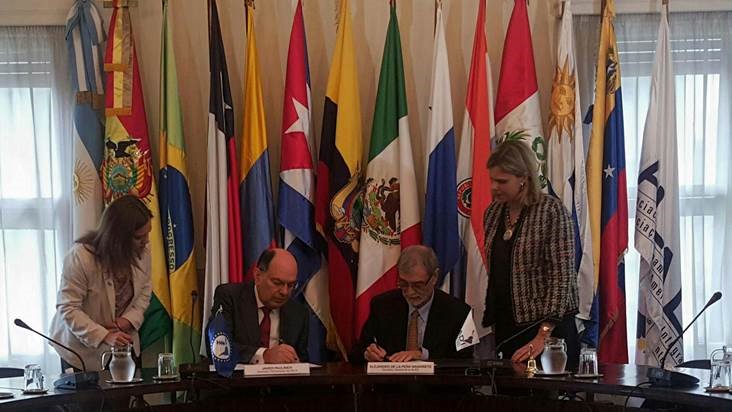
SELA and ALADI join forces to promote trade facilitation in Latin America and the Caribbean!
The Latin American and Caribbean Economic System (SELA) and the Latin American Integration Association (ALADI) will promote joint actions in the economic, social and trade areas in the region.
The Permanent Secretary of SELA, Ambassador Javier Paulinich, and the Secretary General of the Latin American Integration Association (ALADI), Alejandro de la Peña Navarrete, signed the Memorandum of Understanding on 27 October 2017 at the headquarters of ALADI in Montevideo, Uruguay.
Both parties will promote economic and institutional cooperation focused on trade facilitation in processes associated with digitization, simplification and harmonization of procedures according to international standards, including the digital certification of origin, certified electronic signatures, and electronic commerce; as well as in the development of skills and capacities for greater efficiency, transparency and security within the framework of regional integration.
In accordance with their respective spheres of competence, they will be able to carry out the following activities: a) Exchange of information, coordination and cooperation in regulatory technical aspects and for the promotion of information and communications technologies to facilitate digital trade; b) Collect and identify existing asymmetries and the level of progress by country; c) Organize meetings, seminars, workshops, and specific projects in this area.
For further information, visit: http://www.sela.org/
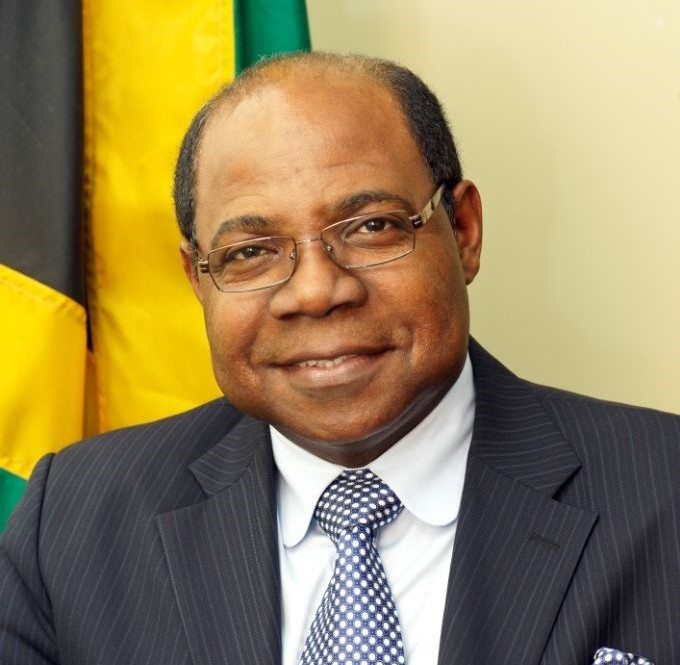
Minister Bartlett to give update of UNWTO Global Conference
Jamaica’s Minister of Tourism, Edmund Bartlett will host a press briefing in association with the Montego Bay Chamber of Commerce, where he will provide an update on the conference to members of the media and directors of the MBCC.
The United Nations World Tourism Organisation (UNWTO), Government of Jamaica, World Bank Group and Inter-American Development Bank Global Conference on Jobs and Inclusive Growth: Partnerships for Sustainable Tourism will take place in our tourism capital, Montego Bay, at the Montego Bay Convention Centre from November 27-29, 2017.
It brings together high-level decision makers in tourism from countries around the world to design an international road map and foster collaborative partnerships for inclusive economic and social development.

Winner of UNWTO Travel Competition announced
The travelers’ competition closed with 2,400 submissions and one lucky winner: Katie Diederichs, who will be embarking on an unforgettable trip across six different countries to tell the world how tourism can make a positive change.
Three weeks after being launched, the Travellers´ Competition closed with 2,400 submissions. All eligible entries received were judged based on creativity and originality, adherence to theme and digital engagement and social influence of participants.
Four years ago, Katie and her husband quit their comfortable 9-to-5 jobs and set off on an adventure that hasn’t yet ended. From backpacking in South America to trekking to Everest Base Camp to living as expats in Asia, they´ve been privileged to experience many cultures around the world.
“During our wanderings, I’ve learned that tourism is a powerful thing.” Katie said in her submission. She also added “There are ways – both big and small – that every traveler can lessen the footprint they leave. My passion is educating others and myself about how we can travel more sustainably.”
Katie will be embarking on the 24th of November on a journey across the world that will be supported by Explore WorldWide, an adventure travel group offering a wide range of activities and experiences with a commitment to responsible travel and a pinch of Explore spirit.
Katie will be visiting sustainable tourism projects in Colombia, Germany, Mexico, the United Arab Emirate of Ras Al-Khaimah and the Léman region in Switzerland, all partners of the initiative.
Together with her life and travel partner, she manages the website, ‘Two Wandering Soles’, focused on ethical travel for people on all budgets. With 35,000+ monthly visitors and a growing following on social media, Katie would make a fantastic representative of a “responsible traveler” that people from all walks of life can relate to.
The jury of the competition comprised Sandra Carvao, Chief of Communications and Publications at UNWTO, Sofia Panayiotaki, Founder and CEO, PR MEDIACO and John Tefler, Interim Managing Director at Explore Worldwide.
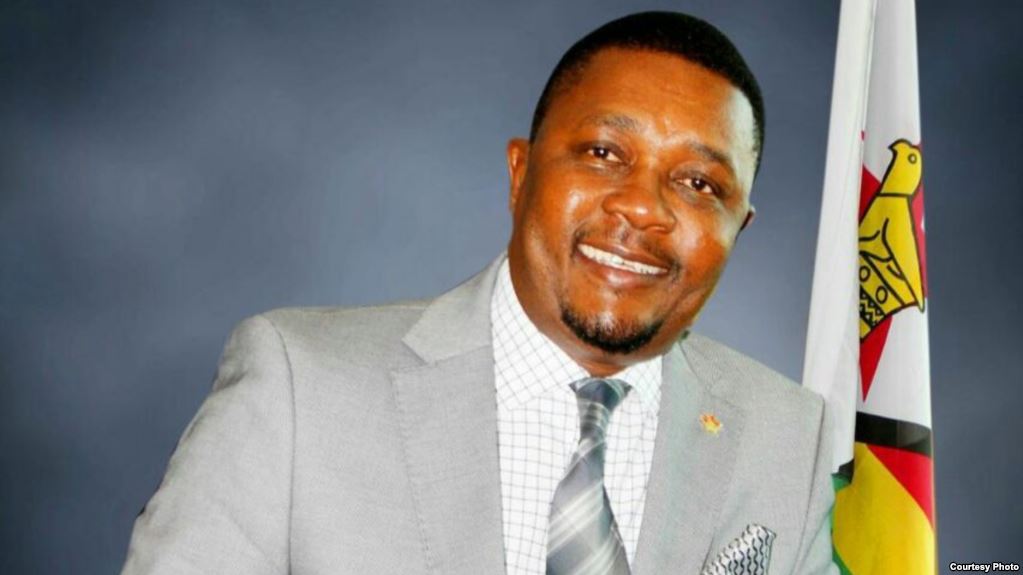
Dr. Walter Mzembi : 20 questions and answers as Foreign Minister Zimbabwe
The Honorable Dr. Walter Mzembi, Minister of Foreign Affairs ZImbabwe provided Worldtourismwire a copy of this Q&A first published in the Zimbabwe Daily News. Minister Mzembi was a candidate for UNWTO Secretary General and served 10 years as the minister of tourism and hospitality for Zimbabwe.
Two weeks ago Mr. Mzembi was appointed Foreign Minister of Zimbabwe.
Question 1.
Congratulations Minister of Foreign Affairs – We are humbled that you agreed to this interview.
I granted you this interview on the back of my strong belief that there is space for independent reporting in this country to the extent that it is humane, truthful and accurate, fair and impartial.
Your story of the 24th of October 2017, in all fairness, was a breach of these cardinal principles and bordered on malice. However, I must complement you for your sense of self-accountability in granting me this interview which I hope will inform the public correctly.
Question 2.
Are you bitter about the bad press that has given you a bumpy landing in the Foreign Ministry?
Bad press sells. However, there is always the flip side which is the positive in the degree of awareness and free publicity that it brings around issues and personalities. The wiser seize the opportunity to turn that adversity into an opportunity, hence the saying “when given lemons make lemonade”. I have lived this principle in the Tourism Ministry and the results are what you publicly acknowledge as a successful stint.
“When people throw you stones, it’s because you are a good tree full of fruits. They see a lot of harvest in you. Don’t go to their level by throwing them back the stones, but throw them your fruits so the seeds of yourself may inspire them to change their ways.”
On the perceived bumpy landing, quite to the contrary, the landing has been a soft one because my deployment in Tourism has been the forerunner and an extension of foreign relations and diplomacy. My only remaining task is to convert my Tourism legacy into statecraft.
Question 3.
Are you coming up with a new Foreign Policy Whitepaper?
Our Foreign Policy is already in place and the prerogative of the President. He set the parameters of the country’s Foreign Policy way back in 1980 when he enunciated our policy of national reconciliation urging us to “turn swords into ploughshares”.
My favourite Prophet Isaiah, in Chapter 2 verse 4, himself the philosophical source of this prophetic statement by the President says “The Lord will mediate between nations and settle international disputes. They will hammer their swords into ploughshares and their spears into hooks. Nation will no longer fight against nation or train for war any more” This is the basis of contemporary diplomacy.
It is therefore not my duty to invent the wheel, so to speak, but rather to ensure that the wheel can tackle effectively all the different terrain that it must of necessity travel. Consequently therefore, it is incumbent upon my ministry to ensure that Zimbabwe’s Foreign Policy is implemented effectively in the given atmosphere and in realising our national interests.
As is the case in other countries, Zimbabwe’s Foreign Policy seeks to advance the country’s domestic policy objectives on the international stage. To that extent, our Foreign Policy is an extension of our domestic policy.
The tenets of our national interests are self-preservation, the protection and enhancement of the country’s image, the prosperity and welfare of our people, preservation of peace and national cohesion, and peaceful good neighbourliness.
My mandate is therefore to advance the country’s Foreign Policy that has been enunciated by the President, and agreed to in Government. There is no “Mzembi Foreign Policy”. The difference is only in style of delivery.
Question 4.
You have been a front-line diplomat for Zimbabwe as Tourism and Hospitality Industry Minister for almost 10 years. Can you outline your foreign policy priorities? What will be the key pillars of your diplomacy?
Overall our Foreign Policy will be both dynamic and responsive to the ever changing world. Our thrust would be the opening of new frontiers of diplomatic relations, nursing and nurturing old friendships, rapprochement and robust re-engagement and economic diplomacy. We envisage cultivating support of our diasporans in investment and remittances.
Public diplomacy will take centre stage in particular the need to signpost “zero tolerance to violence” as we approach the 2018 elections. Hate speech now constitutes the major component of violence of citizens against each other, and should be outlawed.
We are looking forward to dialogue with those countries that have disengaged from us, re-forge beneficial relations anew. We also want to reposition the country in order to make it more attractive to foreign investors.
My vision is to see Zimbabwe emerging from the current estrangement both in terms of Government to Government contact and broader economic relations further afield. The key pillars of my tenancy will thus essentially be strengthening relations with old friends, establishing news frontiers of cooperation, re-engagement and rebranding the country to be an attractive investment destination. We must become a better place to invest in than is currently the case.
Achieving these milestones will not be without headwinds.
Question 5.
There is a sense that the Foreign Affairs Ministry wasn’t delivering in some key areas? Government owes foreign embassy staff millions in salary arrears, arrears for operational expenses, and school fees refunds for children of staff at the 46 diplomatic missions and consulates. How are you going to help your diplomats around the world?
The national debt issue is a matter of public record. Therefore treating Foreign Affairs indebtedness in isolation could be misplaced as it is a microcosm of the global picture.
The solution to this problem is not only in thinking outside the box but in discarding the box.
We should be exploring other innovative ways of self-sustenance and I have many creative solutions to this problem which cannot be brought into the public domain.
Question 6.
At least 12 of Zimbabwe diplomatic missions have been sued over salary arrears for staff and some have been put under legal notice for eviction over unpaid rentals. The parliamentary committee on Foreign Affairs recently recommended that government reduces the foreign missions to a number it can sustain. Of course the decision to cut the missions can only be made by President Robert Mugabe. What would you say about this recommendation given that government is currently facing a critical funding shortfall?
Reducing the number of our Embassies is a short term kneejerk solution as those Embassies and Consulates were established to serve specific interests. We might decide to close down Embassy “X” only to discover that a few years down the line we would need such an Embassy for strategic reasons.
It is an established fact that where countries in such situations have closed their embassies, the cost of re-establishing them has been greater than the cost of having left them operational.
Our Missions are already streamlined given that we have at least 192 countries and territories that have to be serviced, and what we have is already a small number in this global interdependent world of today.
In fact, quite to the contrary, in line with my policy thrust of reactivating lost friendships and opening new frontiers and in pursuit of our goal in economic diplomacy, there would actually be a case for expansion. The world is bigger than our colonial history. Our current realities far outweigh the spread of our diplomatic missions.
We have zero to minimal representation in some regions such as Latin America, the Pacific, Eastern Europe and the Middle East. Our thrust of economic diplomacy dictates that we open new frontiers of representation.
I shall certainly be recommending a new matrix of representation to the President that may include streamlining in some regions and reinforcing in others as well as opening up new frontiers.
Question 7.
What do you regard as the challenges ahead?
I don’t want to add to the list of cry-babies. The laundry list is the opportunities ahead of us.
Question 8.
How did your UNWTO campaign prepare you for this job? You narrowly lost the bid but got a plush job back home.
My tenure at the Ministry of Tourism and Hospitality Industry was a good fortuitous training ground for this new post. I engaged various constituencies during my leadership of the Zimbabwe delegation to the ACP-EU Joint Parliamentary Assembly between 2004 and 2006 when we were fighting the imposition of sanctions on the country by the EU.
Campaigning for the post of Secretary General of the UNWTO enabled me to engage over 80 governments worldwide, during which travels I met Presidents, Vice Presidents, Prime Ministers, and Foreign Ministers as I sought their support.
I have also had the opportunity to interact and exchange ideas with eminent personalities amongst them former Foreign Secretaries of the UK and the USA. (Including Jack Straw and David Milibrand and Hilary Clinton). My conversations with them has enlightened me on opportunities for future mutually beneficial engagements.
This has certainly prepared me for my current post and I am confident that with the support of my experienced Ministry staff, we will achieve our stated goals.
In hindsight, the UNWTO was an exercise in the magnification of my acquired skills which perhaps could have caught the attention of the appointing authority and its attendant Cabinet Commendation.
Question 9.
And then there is this hullabaloo about Montevideo, the rescission of an honour bestowed on President Mugabe to be WHO global ambassador for Africa hardly four days later. What happened in Montevideo?
In brief, African delegates to the Conference, and they included Angola, Guinea, Guinea Bissau, Mozambique, Niger, Sao Tome and Principe, Sudan, Tanzania, Togo, Zambia and Zimbabwe requested me to engage the WHO on their behalf and seek the appointment of the President as the Goodwill Ambassador for Africa. I must applaud the WHO Director General, Dr Tedros Adhanom Ghebreyesus, for the initial bravery which led him after his own internal consultations, to accede to the request which he communicated to the Minister of Health and myself before the commencement of the High Level Forum that he would be announcing the designation of the President to this honorary role.
With all good intentions we informed the President accordingly. Thereafter, Dr. Tedros Adhanom Ghebreyesus proudly announced and justified the appointment of the President with the attendant citation. What we perhaps underestimated was the backlash. Little did we know that there were other constituencies with other convictions concerning this issue. The rest is now water under the bridge.
Question 10.
Do you feel you were justified to lobby for President Mugabe to be WHO ambassador, what were your reasons?
I was approached by the African constituency at the meeting, and for me, it made sense then and now, and there are no regrets. The President does not require to be bestowed an honour in the pursuit of his principles and convictions. He successfully advocated, lobbied and resource mobilised for the Ebola affected countries in West Africa at the UN in 2015 without this designation. As I speak, he will carry on with his agenda on NCDs on behalf of Africa notwithstanding. It was not about the honour, it was about saving lives in line with SDG Goal 3, target 3.4, which implores us to reduce, by one third, premature mortality from NCDs through prevention and treatment and promoting mental health and wellbeing.
Question 11.
Was this a government position or your own initiative? Did you take the Zim delegation into your confidence on this issue?
I am part of government and any action by my Ministry is within the context of a collegiate.
Question 12.
Did you discuss with the President that you were lobbying on his behalf for this post?
I have already answered this question. However, let me reiterate that as Minister of Foreign Affairs, I am the lead advocate for my President and country’s brand.
Question 13.
With this fall-out, do you think you did the right thing?
Absolutely, any perceived fall-out is imaginary.
Question 14.
Presidential spokesman George Charamba has sharply contradicted you on this award. What is your reaction to that?
I am not aware of any contradictions. Mr Charamba was part of our delegation and in fact his media team was responsible for information dissemination from Uruguay which is a matter of public record.
Question 15.
Does government genuinely support the fight against NCDs given that Charamba has said we are a tobacco producing nation, and we cannot join the WHO campaign against tobacco, or smoking? Is it government policy to continue producing tobacco because of its foreign currency earning power even though tobacco is killing 7,000 Zimbabweans through NCDS such as cancer every year?
Zimbabwe is a signatory to the WHO Framework Convention on Tobacco Control (FCTC) and its economy is transitioning to alternatives. However, in the interim, we will continue to strictly observe the set guidelines in the production and trading of tobacco. FCTC does not abruptly stop production and trade in tobacco, but puts guidelines for countries like Zimbabwe for which tobacco is part of its economic mainstay.
I urge you as journalists to be fully conversant with this and other international conventions in order to disseminate correct information and facts to your constituency.
Question 16.
It seems government is speaking with a forked tongue on this, what is the problem?
In international relations, forked tongues are a function of national interest in the pursuit of diplomacy. I would urge you to do your own research on forked tongues by some other international players at and within other multilateral agencies (the Paris Climate Change Agreement, NAFTA, Iran Nuclear Deal, UNESCO, just to name a few). You don’t seem to be interested in interrogating the bigger powers at the centre of these Agreements. You undermine your national interest at the slightest excuse.
Question 17.
Can you outline your vision for Zimbabwe’s diplomatic engagement with Western countries, recently Lord Soames was here and there is a sense government is seeking rapprochement with its former colonisers, Britain?
This is what the President had to say in April 1980 about Lord Soames, the last colonial Governor of the then Rhodesia, “I must admit that I was one of those who originally never trusted him, and yet I have now ended up not only implicitly trusting but fondly loving him as well”
This is the personal relationship between him and the Soames family. Sir Nicholas Soames himself was tracing the footprints of his father. If this brings us political capital in the direction of political rapprochement and engagement, then it is welcome. Zimbabwe still maintains diplomatic relations with western counties and in fact, going forward, as I have indicated, we will soon embark on robust diplomatic engagement with all countries that we have diplomatic relations with, including western countries.
I shall shortly be meeting all the Ambassadors accredited to Zimbabwe to share my policy thrust going forward and our expectations of them. Equally, I shall engage our Missions abroad with the same objective.
Everything is diplomacy and the diplomacy deficit in our interactions is going to be a thing of the past.
Question 18.
Some people say President Mugabe is a hard-sell product in international diplomacy, what is your take on this?
A “hard sell” does not win elections consecutively every time they are due. This “hard sell”, according to you will break the Guinness Book of Records when he cruises to victory yet again in the forthcoming elections. Our homework is conversion of his domestic and continental appeal into acceptance by specific sections of the international community hence the policy thrust that I have already outlined.
Question 19.
What type of relationship do you have with the President?
The President is the father figure of the entire nation, and that’s how we all relate to him. My colleagues and I in Cabinet feel greatly indebted to the President to continue to serve in this capacity under his leadership which is a rare privilege. No matter how great one was born to be, someone has to release you.
Question 20.
Will your Foreign Policy thrust take him on-board?
There is no Foreign Policy thrust which excludes the Head of State. Do not expect me to park my president at a layby.

Aviation and Border Control Management for the future in travel
The Vice President of International Affairs for Etihad Aviation Group, and President of Hermes, Vijay Poonoosamy, presented “Making air travel more secure and efficient” at the Thirteenth Symposium and Exhibition on ICAO under the Traveler Identification Program of the event, Moderator Session 7: Border Control Management and Future in Travel. The event took place at the ICAO Headquarters in Montreal, Canada, from October 24-26, 2017.
Here, Worldtourismwire shares his presentation:
UNWTO has shown that destinations worldwide welcomed 598 million international tourists in the first six months of 2017, 36 million more than in the same period of 2016.
IATA stated two days ago that the 4 billion air passengers expected to fly this year are expected to double to 7.8 billion in 2036.
With the formidable growth of both passenger numbers and security threats it is self-evident that much more needs to be done to diligently develop a strategic and holistic roadmap to promote safe, secure, sustainable and seamless aviation.
In line with UN Security Council Resolutions 2178 (2014) and 2309 (2016) that re-affirmed the importance of border controls to combat terrorism, the interdependent elements of the ICAO Traveler Identification Program (TRIP) Strategy demonstrate that a coherent and coordinated approach to a robust traveler identification management is essential.
All the Stakeholders of Travel and Tourism have a vested interest in safe and secure operations and have safety and security as the number one priority.
Let’s not talk of balancing security and facilitation as this suggests compromise on either or even both.
Let’s focus on promoting a robust, efficient, cost effective, inclusive and harmonized global process to enhance security.
Let’s develop a global program to link international security with global connectivity while leaving no country behind.
To have a wholly automated, electronic platform, built on verified biometric data, require that a number of areas be addressed, namely, the harmonization of intelligence and data-sharing, the global implementation of common standards set by ICAO and the shift to a secure digital process and a single application system.
Governments should agree that a single token that can be used throughout the journey, including airline and airport processes, security, border inspection.
Interoperability between countries and systems (customs, immigration, security, airline and airport systems), greater use of available programs such as Interpol’s I-Checkit and greater uptake of on-line and mobile processing are also required.
These necessary policy shifts require additional cooperation and collaboration among various agencies of governments, international organizations, the Travel & Tourism industry/businesses and travelers. Moreover, national governments need to implement the international standards established by ICAO and help ICAO assist emerging economies in implementing those standards.
The cross-border movement of people will then not only become more efficient, but it will also enable public safety officials to direct more attention and resources to the risk-based identification of threats.
As a result, travelers will have a secure and pleasant experience.
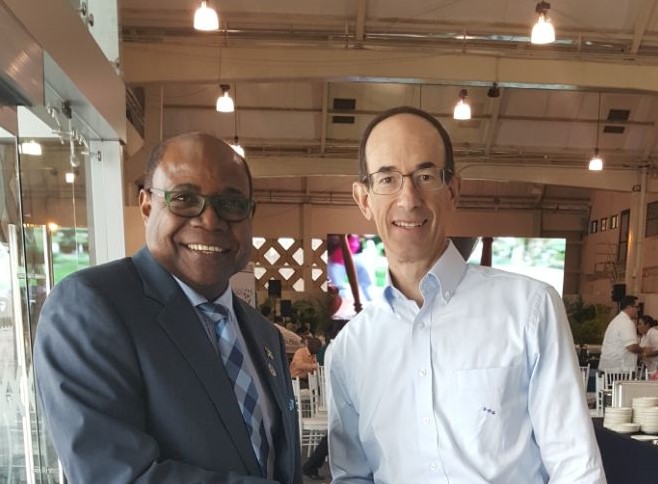
FCCA Chairman Adam Goldstein Endorses UNWTO Conference
KINGSTON, Jamaica; October 25, 2017: The Florida-Caribbean Cruise Association (FCCA) has announced their endorsement of the United Nations World Tourism Organization’s (UNWTO) global conference to be held in Jamaica in November.
Adam Goldstein, who is the FCCA’s Executive Committee Chairman and current President and COO of Royal Caribbean Cruises Ltd, gave the endorsement to Tourism Minister, Hon. Edmund Bartlett, during a private meeting between Presidents and CEOs of FCCA member lines and Ministers of Tourism, on October 25 in Merida, Mexico.
During the meeting, the group also discussed strategies to drive year-round traffic to the region, the creation of more employment opportunities and the development of strategic partnerships.
Minister Bartlett lauded the endorsement, which, he noted, strengthens the expected impact the conference will have on the development of tourism industries across the globe.
“This event will perhaps be the single most important conference in our country’s history. This endorsement by FCCA strengthens our efforts to coordinate an international road map which will foster collaborative relationships for more inclusive economic and social development of countries across the world via tourism,” said Minister Bartlett.
He also received support for the staging of the conference from Grenada’s Minister for Tourism and Civil Aviation, Hon. Yolande Bain-Horsford, who is expected to participate in the conference.
In his capacity as chairman of the newly formed Caribbean Tourism Recovery Group Secretariat (CTRGS) and coordinator of the ‘UNWTO Disaster Recovery Working Group for the Affected States in the Caribbean, the Minister used the opportunity to share his intentions to create a tourism rehabilitation plan for Caribbean islands devastated by recent hurricanes at the upcoming conference.
“Caribbean states are very dependent on tourism to sustain their economies. So with the assistance of the UNWTO, CHTA, CTO and WTTC as well as Ministers of the region we are working on creating a strategy to strengthen the sector’s resilience to the effects of climate change and natural disasters, thus making it more sustainable. We will unveil this plan of action during our upcoming UNWTO global conference in Montego Bay in November,” he explained.
The UNWTO, Government of Jamaica, World Bank Group and Inter-American Development Bank Global Conference on Jobs and Inclusive Growth: Partnerships for Sustainable Tourism’ will be held November 27-29 at the Montego Bay Convention Centre, St. James, and is expected to attract hundreds of international and local participants.
The event will bring together world leaders from the tourism industry along with governments, donors, and international development and finance organisations to design and coordinate an international road map and foster collaborative relationships for inclusive economic and social development via tourism.
Minister Bartlett is currently in Mexico with the newly-appointed Executive Director of Jamaica Vacations Ltd, Joy Roberts, participating in the FCCA Cruise Conference and Tradeshow. They are expected to return to the island on October 26, 2017.
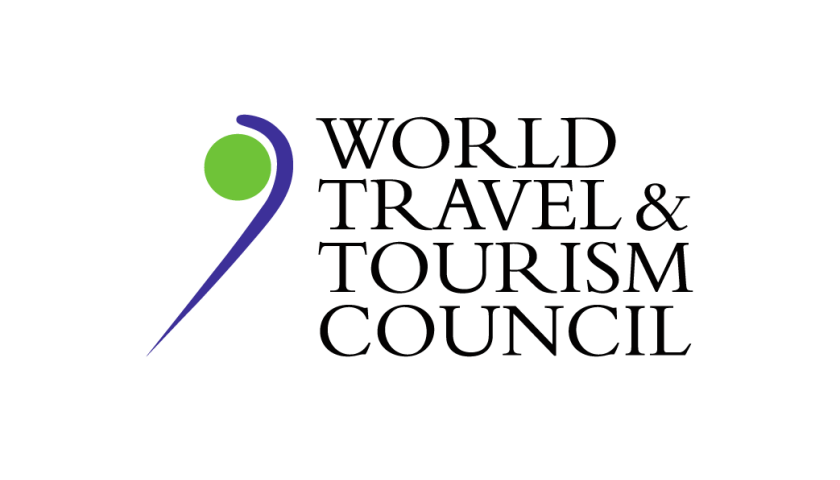
World’s top ten fastest growing cities are all in Asia
The World Travel & Tourism Council (WTTC) has launched today new city tourism impact data which shows that the world’s top ten fastest growing tourism cities are all in Asia.
Asia Pacific City Travel & Tourism Impact, is one of a series of reports by WTTC which looks at the contribution of Travel & Tourism to city economies and job creation. The study covers 65 cities, 21 of which are in Asia Pacific.
The data shows that Asian cities are at the forefront of tourism growth over the next ten years. Chongqing (14% growth per year) heads the table, followed by Guanghzhou (13.1%), Shanghai (12.8%) and Beijing (12%). The other cities on the top ten list are Chengdu (11.2%), Manila (10.9%), Delhi (10.8%), Shenzhen (10.7%), Kuala Lumpur (10.1%) and Jakarta (10%).
With the world average growth rate at 4% per year, and Asia Pacific at 5.8%, these cities are significantly outpacing both the regional and global average.
Asia Pacific also includes some of the world’s largest Travel & Tourism cities. Shanghai, with an annual tourism GDP contribution of US$30 billion is the largest in the world; followed by Beijing (US$27 billion). Tokyo (US$20 billion) is ranked 6th in the world.
Shanghai and Beijing together account for 21% of China’s Travel & Tourism economic impact (GDP), whereas Tokyo alone accounts for 18% of Japan’s total.
The dominance of the Chinese market is clear, both in terms of future growth and overall size and as a main source market for destinations in the wider Asia Pacific region. The success of Chinese cities is largely driven by domestic business (as high as 94.5% of spend in Chongqing is domestic), and the Chinese outbound market is key for neighbouring cities such as Tokyo (11% of spend is Chinese, the largest market) and Bangkok (38%).
Gloria Guevara, President & CEO, WTTC said “The power of Asian cities when it comes to driving the Travel & Tourism sector is clear to see in this new data. However, not only do these cities contribute significantly to their country’s tourism sector, tourism is an important generator of economic growth and jobs within the cities themselves.
With this level of forecast growth, the importance of investment in long term planning, infrastructure and sustainable public policies cannot be underestimated. It is vital that city authorities understand the economic impact of Travel & Tourism, GDP and employment contribution, and not just visitor arrivals, as they seek to develop new products and opportunities to increase traveller spend and sustainable growth. WTTC has invested in this new research and data to support them in this ambition.”
Other highlights from the report include:
· Singapore’s Travel & Tourism has doubled in the past ten years, to a total of US$12.4 billion in 2016 and supporting 164,000 jobs.
· Tourism in Bangkok generates US$18.2 billion for the city each year, representing 10% of the city’s economy and 50% of Thailand’s Travel & Tourism.
· Delhi and Mumbai together generate over 1 million tourism jobs, 10% of India’s total tourism employment.
· Macau is the most tourism intensive city in Asia Pacific, with 27% of its economy a direct result of tourism spend.
· Eight cities in the study contribute more than 25% of their country’s Travel & Tourism economy: Auckland, Bangkok, Ho Chi Min City, Jakarta, Kuala Lumpur, Manila, Seoul and Sydney.

WTTC calls on tourism sector to embrace sustainability reporting
The World Travel & Tourism Council (WTTC) has called on Travel & Tourism companies to measure, monitor and report their sustainability impact as it launches new guidance on Environmental, Social and Governance (ESG) Reporting for the Travel & Tourism Sector.
Gloria Guevara, President & CEO, WTTC, said: “WTTC’s Global Summit earlier this year focused on how our sector can contribute to the United Nations Sustainable Development Goals (SDGs). We know that Travel & Tourism has a significant role to play in reducing poverty, protecting the environment, and contributing to the inclusive and sustainable growth the SDGs aspire to. Sustainability reporting, that is integrated into financial reports or presented as a separate activity, shows commitment to and progress against these goals. What is more, Goal 12 specifically calls on companies to report their ESG impacts.”
The report covers latest trends in sustainability reporting, including which governments and stock exchanges are mandating such reports, and how companies are refining the reports to be more engaging for audiences. It also includes a 12-step guide to reporting and specific guidance on how to report on the issues of Climate Change; Community; Energy; Governance, Risk and Compliance; Supply Chain; Waste Generation and Diversion; Water; and Workforce.
Guevara continued: “Recent research with WTTC Members highlighted sustainability as a top priority for the sector. Sustainability reporting, which is on the rise across Travel & Tourism, is a mechanism for companies to monitor progress and share best practices. Our aim with this guidance is to support companies, large and small, as they take this journey; and provide them with the mechanism to communicate their progress. As a sector which accounts for 10% of the world’s GDP and generates 292 million jobs, we have a responsibility to ensure that growth is sustainable.”
The report is available to download from www.wttc.org/Sustainability-Reporting
Organisations wishing to share their best practices in sustainable tourism can also apply for WTTC’s Tourism for Tomorrow Awards programme until 14th November 2017 at www.wttc.org/T4TAwards
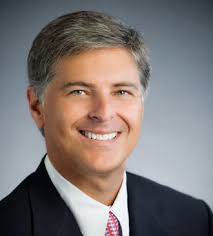
WTTC announces Christopher J. Nassetta as Chairman Elect
The World Travel & Tourism Council (WTTC) today announced the election of Christopher J. Nassetta, President and CEO of Hilton, as the Council’s next Chairman.
Mr Nassetta joined Hilton in 2007, bringing with him an extensive background in real estate and hospitality. Since assuming the role of CEO he has transformed the company, bringing Hilton hospitality to 27 new countries by adding 2,200 hotels to a network of more than 5,000 properties in 103 countries and territories. Before taking the company public in 2013, Chris instilled a guest- and employee-focused culture that is recognised today on multiple Great Place to Work lists. He joined Hilton from Host Hotels & Resorts where he was CEO.
Chris has been a Member of WTTC’s Executive Committee since 2011 and Vice Chairman for North America since 2014.
Mr Nassetta will take over from current Chairman, Gerald Lawless, following the Council’s Annual General Meeting, which will take place in Buenos Aires, Argentina on 17 April 2018. WTTC Chairmen are elected for a two-year term.
Mr Lawless, who has been Chairman of WTTC since April 2016, said: “It has been an honour to serve as Chairman of WTTC for the past two years and I am delighted to be handing over to Chris Nassetta to steer the Council into its next phase of development. I am sure that he and Gloria Guevara, WTTC’s President & CEO, will form a strong team to advocate for the economic and social benefits of Travel & Tourism.”
Mr Nassetta said: “I would like to thank Gerald for his tireless advocacy on behalf of the global Travel & Tourism industry. I am also honoured to accept the role as WTTC Chair at a time of amazing opportunity and growth. I believe the Council can play an important role to bring governments and the industry together to deliver smart plans that support both security and international travel. I also believe that the unique scale and reach of WTTC Members can be used to tackle significant global issues, including climate change and global youth unemployment. A Travel & Tourism industry focused on these challenges can deliver great things for this generation and the next.”
Gloria Guevara, WTTC President & CEO commented, “I would like to thank Gerald for his contribution during his Chairmanship and congratulate Chris on his selection. Their guidance is instrumental to continue to position Travel & Tourism as the best partner for job creation.”
WTTC’s latest data shows that Travel & Tourism accounts for 10% of the world’s GDP, contributing over $7.6 trillion. In 2016, Travel & Tourism supported a total of 292 million jobs around the world, 1 in 10 of all jobs.
About WTTC: The World Travel & Tourism Council is the global authority on the economic and social contribution of Travel & Tourism. It promotes sustainable growth for the sector, working with governments and international institutions to create jobs, to drive exports and to generate prosperity. Every year WTTC, together with Oxford Economics, produces its flagship Economic Impact Report, which looks at the socioeconomic benefits of Travel & Tourism on global, regional and country level. This year the report shows data on 25 regional groupings and 185 countries.
Travel & Tourism is a key driver for investment and economic growth globally. The sector contributes US$7.6 trillion or 10.2% of global GDP, once all direct, indirect and induced impacts are taken into account. The sector also accounts for 292 million jobs or one in ten of all jobs on the planet.
For over 25 years, WTTC has been the voice of this industry globally. Members are the Chairs, Presidents and Chief Executives of the world’s leading, private sector Travel & Tourism businesses, who bring specialist knowledge to guide government policy and decision-making, and raise awareness of the importance of the sector.
WTTC’s annual Global Summit brings together over 900 delegates to discuss the opportunities, challenges and issues facing the industry, while its Tourism for Tomorrow Awards recognise the industry’s power to be a positive force in sustainability. This year’s Summit will take place in Buenos Aires, Argentina, 17-19 April 2017.
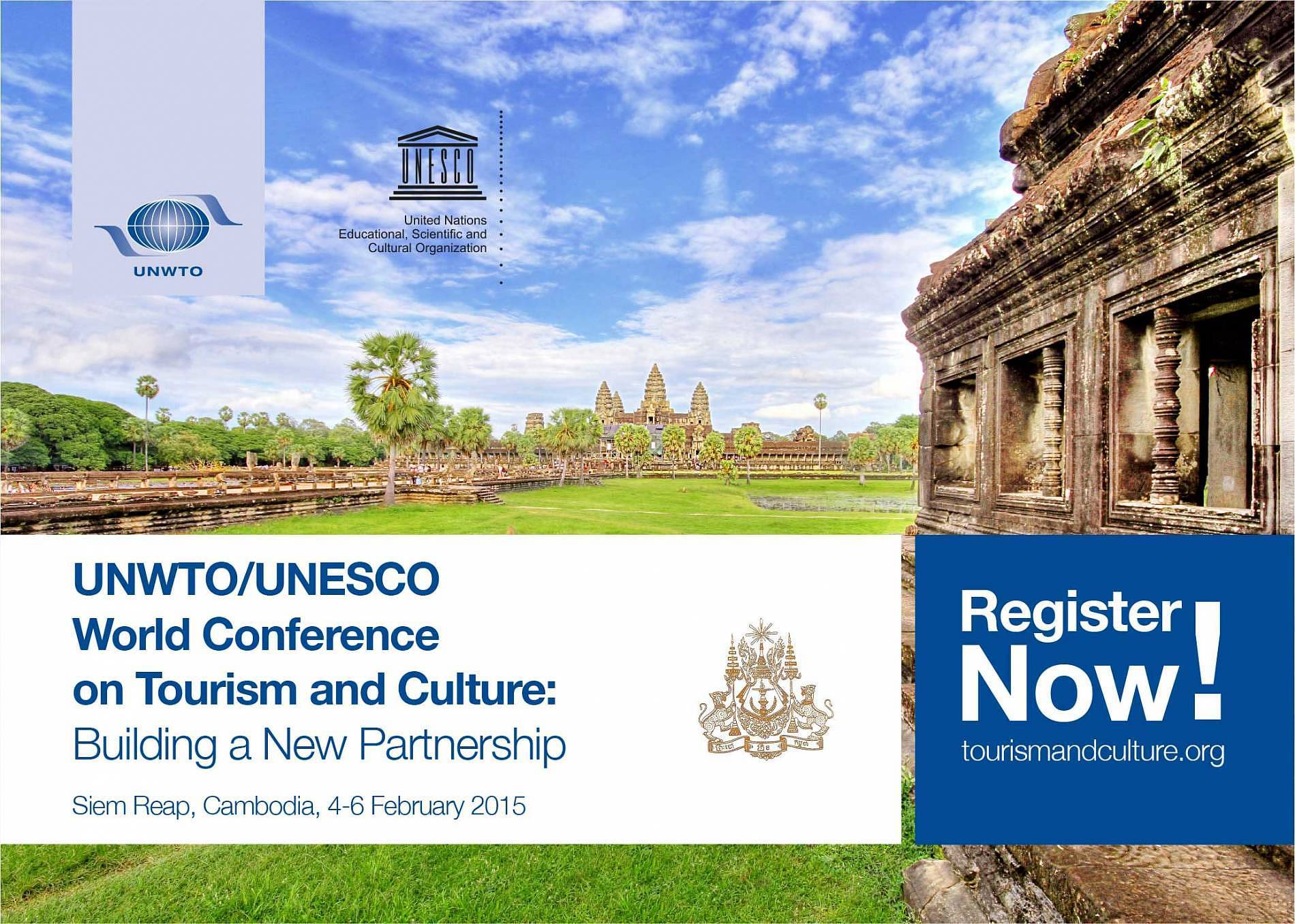
UNESCO, UNWTO and Palestine: USA and Israel leaving UNESCO
At the recent UNWTO General Assembly in Chengdu, China, one discussion point was the acceptance of Palestine as a full member. Backroom diplomacy, pressure by Israel to leave UNWTO and pressure by the United States caused for Palestine to postpone a vote on their full membership to the world tourism body for another 2 years.
The United Nations Educational, Scientific and Cultural Organization (UNESCO) has a close partnership with World Tourism Organization (UNWTO). In 2011 UNESCO accepted Palestine as a full member. Palestine applied for full membership in UNWTO.
This triggered a US law which cut off American funding for any organization that recognized an independent Palestine. The US had previously paid for 22 percent ($80 million) of UNESCO’s annual budget.
This seemed strange because UNESCO is such an inoffensive-seeming organization: Its most prominent function is designating and protecting official international landmarks, called World Heritage Sites — places like The Alamo and the Great Barrier Reef, the Grand Canyon. What possible reason could the US have for quitting an organization devoted to culture and science?
The reason is Palestine. The reason is Israel.
First, the US cut funding for UNESCO after Palestine was accepted as a member state, now US President Trump will be leaving UNESCO in 2018, and minutes later this was echoed by Israel. The US voting rights had been eliminated on and off because of the United States falling behind membership fees.
In 1984, the Reagan administration took out its frustration with the UN on UNESCO over accusations of anti-US, pro-Soviet bias at the UN (it took until 2002 for the US to rejoin). It’s also why the Palestinians, frustrated with the failure of US-sponsored negotiations to produce a peace agreement, pushed to be recognized as a UNESCO member-state: It was a venue in which they stood a real chance at gaining symbolic statehood status, and thus, in theory, putting more diplomatic pressure on Israel to sit down and negotiate.
The Palestinians won their 2011 UNESCO membership by at 107-14 margin (though 52 states abstained). However, this has produced little in the way of progress on an Israeli-Palestinian peace agreement — and the consequences of the subsequent aid cutoff for UNESCO have been severe. Klaus Hüfner, an expert on UNESCO at the Global Policy Forum, termed it a “financial crisis.”
The United States is not a member of the UNWTO. WOuld this mean the US will never be a member as long as a discussion is ongoing for Palestine to join the tourism body? Palestine is now an observer. Will Israel leave UNWTO? It waits to be seen and it is dirty selfish politics after all.
Israeli Prime Minister Benjamin Netanyahu praised the US decision to leave UNESCO as “brave and moral”, a statement said.
The head of the United Nations Educational, Scientific and Cultural Organization (UNESCO) voiced “profound regret” on Thursday over the United States’ decision to withdraw from the agency.
“This is a loss to UNESCO. This is a loss to the United Nations family. This is a loss for multilateralism,” said UNESCO Director-General Irina Bokova in a statement.
“Universality is critical to UNESCO’s mission to strengthen international peace and security in the face of hatred and violence, to defend human rights and dignity,” she added, noting that UNESCO would continue to build a more just, peaceful, equitable 21st century.
Ms. Bokova recalled that in 2011, when the US suspended payment of its membership contributions, she was convinced that the UNESCO never mattered as much for the US or vice versa.
“This is all the more true today,” she continued “when the rise of violent extremism and terrorism calls for new long-term responses for peace and security, to counter racism and antisemitism, to fight ignorance and discrimination.”
Ms. Bokova spelled out her belief that the American people support UNESCO’s actions to harness new learning technologies; enhance scientific cooperation, for ocean sustainability; promote freedom of expression, defend journalists’ safety; empower girls and women as change-makers and peacebuilders; bolster societies facing emergencies, disasters and conflicts; and advance literacy and quality education.
“Despite the withholding of funding, since 2011, we have deepened the partnership between the United States and UNESCO, which has never been so meaningful,” she underscored. “Together, we have worked to protect humanity’s shared cultural heritage in the face of terrorist attacks and to prevent violent extremism through education and media literacy.”
The partnership between UNESCO and the US has ‘drawn on shared values’
The Director General gave examples of collaborating during that time, such as launching the Global Partnership for Girls’ and Women’s Education and celebrating World Press Freedom Day in Washington, D.C., with the National Endowment for Democracy.
She also mentioned a long history of joint endeavours, including working together with the late Samuel Pisar, Honorary Ambassador and Special Envoy for Holocaust Education, to promote education for remembrance of the Holocaust across the world to fight antisemitism and genocide today; cooperating with major US companies Microsoft, Cisco, Procter & Gamble and Intel to keep girls in school and nurture technologies for quality learning; and working with the US Geological Survey, US Army Corps of Engineers, and US professional societies to advance research for the sustainable management of water resources, agriculture.
“The partnership between UNESCO and the United States has been deep, because it has drawn on shared values,” Ms. Bokova stressed.
Citing lines in UNESCO’s 1945 Constitution by US Librarian of Congress Archibald MacLeish – ‘since wars begin in the minds of men, it is in the minds of men that the defences of peace must be constructed’ – she said this vision has never been more relevant, and added that the US helped inspire the 1972 UNESCO World Heritage Convention.
Calling the agency’s work “key to strengthen the bonds of humanity’s common heritage in the face of forces of hatred and division,” she noted the value of World Heritage cites in the US, such as the Statue of Liberty, as being not just as a defining US symbol but that it speaks for people across the world.
“UNESCO will continue to work for the universality of this Organization, for the values we share, for the objectives we hold in common, to strengthen a more effective multilateral order and a more peaceful, more just world,” Ms. Bokova concluded.
The agency is known for designating world heritage sites such as Syria’s Palmyra and the US Grand Canyon.
Unesco head Irina Bokova earlier called the US withdrawal a matter of “profound regret”.
She admitted, however, that “politicisation” had “taken its toll” on the organisation in recent years.
The withdrawal represented a loss to the “UN family” and to multilateralism, Ms Bokova added.
The US withdrawal will become effective at the end of December 2018 – until then, the US will remain a full member. The US will establish an observer mission at the Paris-based organisation to replace its representation, the state department said.
